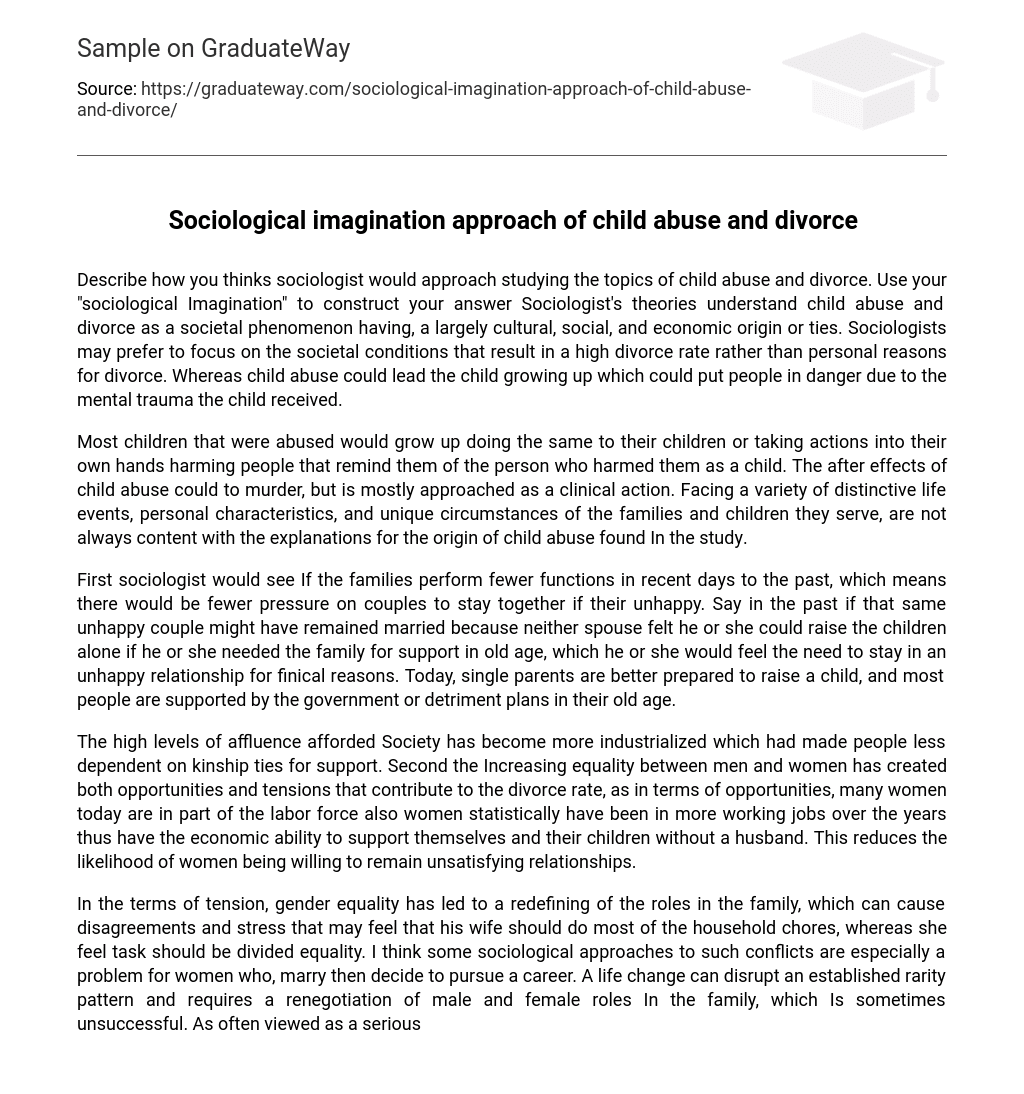Describe how you thinks sociologist would approach studying the topics of child abuse and divorce. Use your “sociological Imagination” to construct your answer Sociologist’s theories understand child abuse and divorce as a societal phenomenon having, a largely cultural, social, and economic origin or ties. Sociologists may prefer to focus on the societal conditions that result in a high divorce rate rather than personal reasons for divorce. Whereas child abuse could lead the child growing up which could put people in danger due to the mental trauma the child received.
Most children that were abused would grow up doing the same to their children or taking actions into their own hands harming people that remind them of the person who harmed them as a child. The after effects of child abuse could to murder, but is mostly approached as a clinical action. Facing a variety of distinctive life events, personal characteristics, and unique circumstances of the families and children they serve, are not always content with the explanations for the origin of child abuse found In the study.
First sociologist would see If the families perform fewer functions in recent days to the past, which means there would be fewer pressure on couples to stay together if their unhappy. Say in the past if that same unhappy couple might have remained married because neither spouse felt he or she could raise the children alone if he or she needed the family for support in old age, which he or she would feel the need to stay in an unhappy relationship for finical reasons. Today, single parents are better prepared to raise a child, and most people are supported by the government or detriment plans in their old age.
The high levels of affluence afforded Society has become more industrialized which had made people less dependent on kinship ties for support. Second the Increasing equality between men and women has created both opportunities and tensions that contribute to the divorce rate, as in terms of opportunities, many women today are in part of the labor force also women statistically have been in more working jobs over the years thus have the economic ability to support themselves and their children without a husband. This reduces the likelihood of women being willing to remain unsatisfying relationships.
In the terms of tension, gender equality has led to a redefining of the roles in the family, which can cause disagreements and stress that may feel that his wife should do most of the household chores, whereas she feel task should be divided equality. I think some sociological approaches to such conflicts are especially a problem for women who, marry then decide to pursue a career. A life change can disrupt an established rarity pattern and requires a renegotiation of male and female roles In the family, which Is sometimes unsuccessful. As often viewed as a serious failing in a person’s life, with divorced people frequently labeled as morally inferior. Sociologist looks at this idea to be able to study today’s divorces and understand the “whys” and “wows” of divorce, because it brings out a bigger picture than in a lot of divorce situations. Also a sociologist would look at every possible outcome and variables because it opens up a new path to as why divorce happens and how does it cause child abuse.
Sociologist would approach all the statements above with an observational view, such as divorce but not based on personal reason, but based on society and economically. Whereas child abuse is theory base on distinctive characteristics to a downfall of a never ending cycle. Sociologist approaches divorce at a Marco level because it looks at a large-scale social processes, such as social stability and change. Sociologist looks at Child abuse at a micro level because it looks at a small-scale interaction between individuals, such as conversation or group dynamics.





